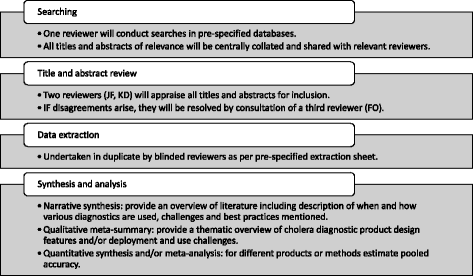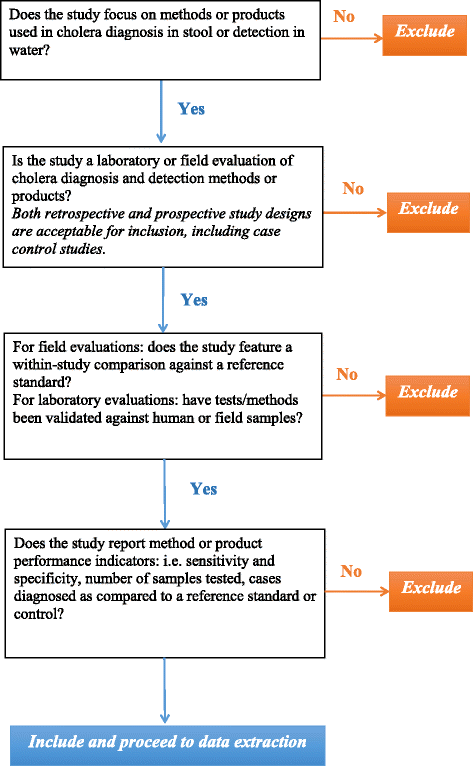Cholera diagnosis in human stool and detection in water: protocol for a systematic review of available technologies
- PMID: 29458416
- PMCID: PMC5819268
- DOI: 10.1186/s13643-018-0679-8
Cholera diagnosis in human stool and detection in water: protocol for a systematic review of available technologies
Abstract
Background: Cholera is a highly infectious diarrheal disease spread via fecal contamination of water and food sources; it is endemic in parts of Africa and Asia and recent outbreaks have been reported in Haiti, the Zambia and Democratic Republic of the Congo. If left untreated, the disease can be fatal in less than 24 h and result in case fatality ratios of 30-50%. Cholera disproportionately affects those living in areas with poor access to water and sanitation: the long-term public health response is focused on improving water and hygiene facilities and access. Short-term measures for infection prevention and control, and disease characterization and surveillance, are impaired by diagnostic delays: culture methods are slow and rely on the availability of infrastructure and specialist equipment. Rapid diagnostic tests have shown promise under field conditions and further innovations in this area have been proposed.
Methods: This paper is the protocol for a systematic review focused on identifying current technologies and methods used for cholera diagnosis in stool, and detection in water. We will synthesize and appraise information on product technical specifications, accuracy and design features in order to inform infection prevention and control and innovation development. Embase, MEDLINE, CINAHL, Proquest, IndMed and the WHO and Campbell libraries will be searched. We will include studies reporting on field evaluations, including within-study comparisons against a reference standard, and laboratory evaluations reporting on product validation against field stool or water samples. We will extract data according to protocol and attempt meta-analyses if appropriate given data availability and quality.
Discussion: The systematic review builds on a previous scoping review in this field and expands upon this by synthesising data on both product technical characteristics and design features. The review will be of particular value to stakeholders engaged in diagnostic procurement and manufacturers interested in developing cholera or diarrheal disease diagnostics.
Systematic review registration: PROSPERO CRD42016048428 .
Keywords: Cholera; Cholera infection prevention and control; Cholera surveillance; Diagnosis; Diagnostic product; Medical device; Technology.
Conflict of interest statement
Ethics approval and consent to participate
Not applicable.
Consent for publication
Not applicable.
Competing interests
The authors declare that they have no competing interests.
Publisher’s Note
Springer Nature remains neutral with regard to jurisdictional claims in published maps and institutional affiliations.
Figures


References
-
- Snow J. On the mode of communication of cholera [Internet]. London: John Churchill; 1855. Available from: https://play.google.com/store/books/details?id=-N0_AAAAcAAJ&rdid=book%2D....
-
- World Health Organization. Weekly epidemiological record: cholera. Wkly Epidemiol Rec - WHO. 2016;(23):297–304.
-
- World Health Organization . Global Health Observatory: cholera. 2016.
-
- Waldman RJ, Mintz ED, Papowitz HE. The cure for cholera: improving access to safe water and sanitation. N Engl J Med. 2013;368(7):592–4 - PubMed
Publication types
MeSH terms
Grants and funding
LinkOut - more resources
Full Text Sources
Other Literature Sources
Medical

